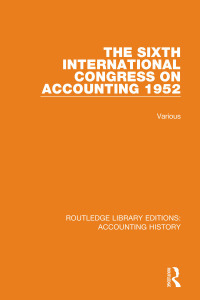Question
Please answer all 1. Under IFRS, which of the following statements regarding prior-period accounting errors is true? a) the correct information was available at the
Please answer all
1. Under IFRS, which of the following statements regarding prior-period accounting errors is true?
a) the correct information was available at the time the error was made
b) the correct information was not available at the time the error was made
c) One should use hindsight to judge whether there is an accounting error that requires correction.
d) An example of a correction of an error is the difference between the amount of the allowance for doubtful accounts and the actual amount of bad debts
2. Which of the following best describes the subsequent events period for financial reporting under IFRS?Which of the following best describes the subsequent events period for financial reporting under IFRS?
a) The interval between the end of the reporting period and when the financial statements are authorized for issue
b) The interval between the end of the reporting period and when the financial statements are issued
c) The interval between the beginning of the reporting period and when the financial statements are authorized for issue
d) The interval between the beginning of the reporting period and when the financial statements are issued
3. Which of the following statements regarding subsequent events under IFRS is true?
a) If a subsequent event is determined to be material, it will be adjusted for in the financial statements prior to issue.
b) Non-adjusting events are adjusted for in the financial statements prior to issue if they are deemed material.Non-adjusting events are adjusted for in the financial statements prior to issue if they are deemed material.
c) Adjusting events provide evidence of conditions that existed at the end of the reporting period.
d) Subsequent events are only adjusted for if they are unfavourable to the reporting entity.
4. Under IFRS, assuming that all transactions are material, which of the following is LIKELY a subsequent event that requires adjustment in the financial statements?
a) The company determined subsequent to year end that, due to a power failure after year end, a significant amount of inventory that existed at year end had spoiled.
b) An employee of the company was fired after year end, when it was discovered that he had been bribing government officials for the past three years. After year end, a penalty was imposed on the company related to this illegal act.
c) The company decided after year end to pay compensation to the widow of a longterm employee who died before year end.
d) A labour dispute was initiated and settled after year end, and the company is required to pay out retroactive wage increases for the past year.
5. Under IFRS, which of the following statements regarding subsequent events is true?
a) Disclosure of the nature of an event and an estimate of its financial effect, or a statement that such an estimate cannot be made, is required for any non-adjusting subsequent event.
b) Disclosure of the date that the financial statements were authorized for issue, and of who gave that authorization, is required.
c) Adjustment for changes in tax rates that were enacted after the reporting period but before the financial statements were authorized for issued, and that have a significant effect on the current tax liabilities, is required.
d) No action is required for the plan to discontinue the operations of a main segment of the entity, which was announced after the reporting period
Step by Step Solution
There are 3 Steps involved in it
Step: 1

Get Instant Access to Expert-Tailored Solutions
See step-by-step solutions with expert insights and AI powered tools for academic success
Step: 2

Step: 3

Ace Your Homework with AI
Get the answers you need in no time with our AI-driven, step-by-step assistance
Get Started


